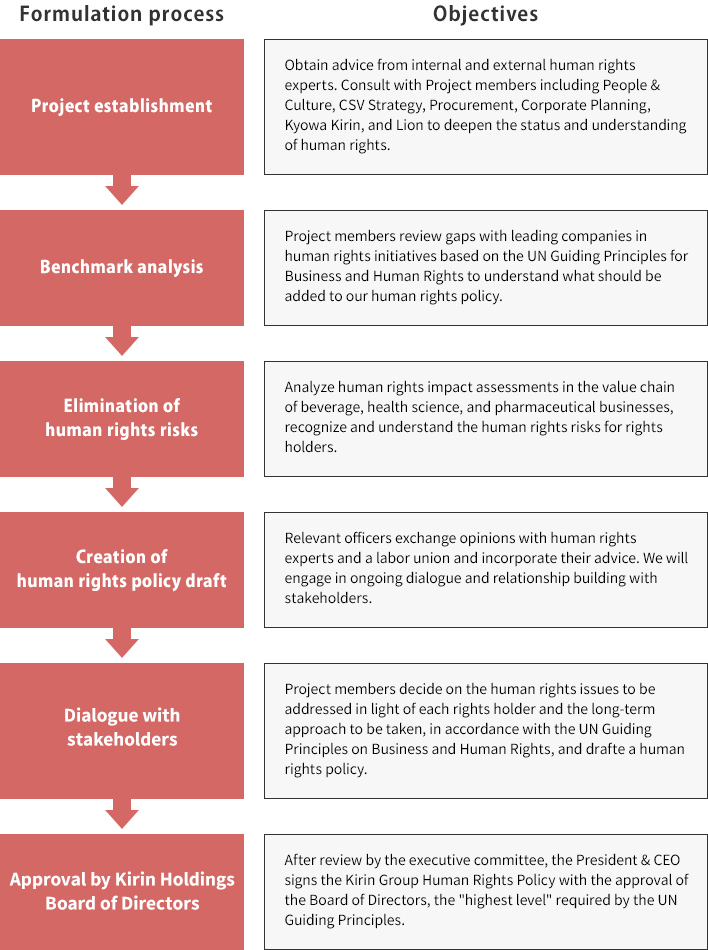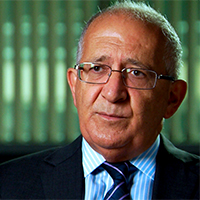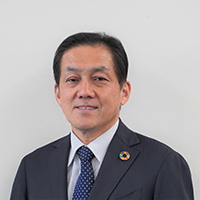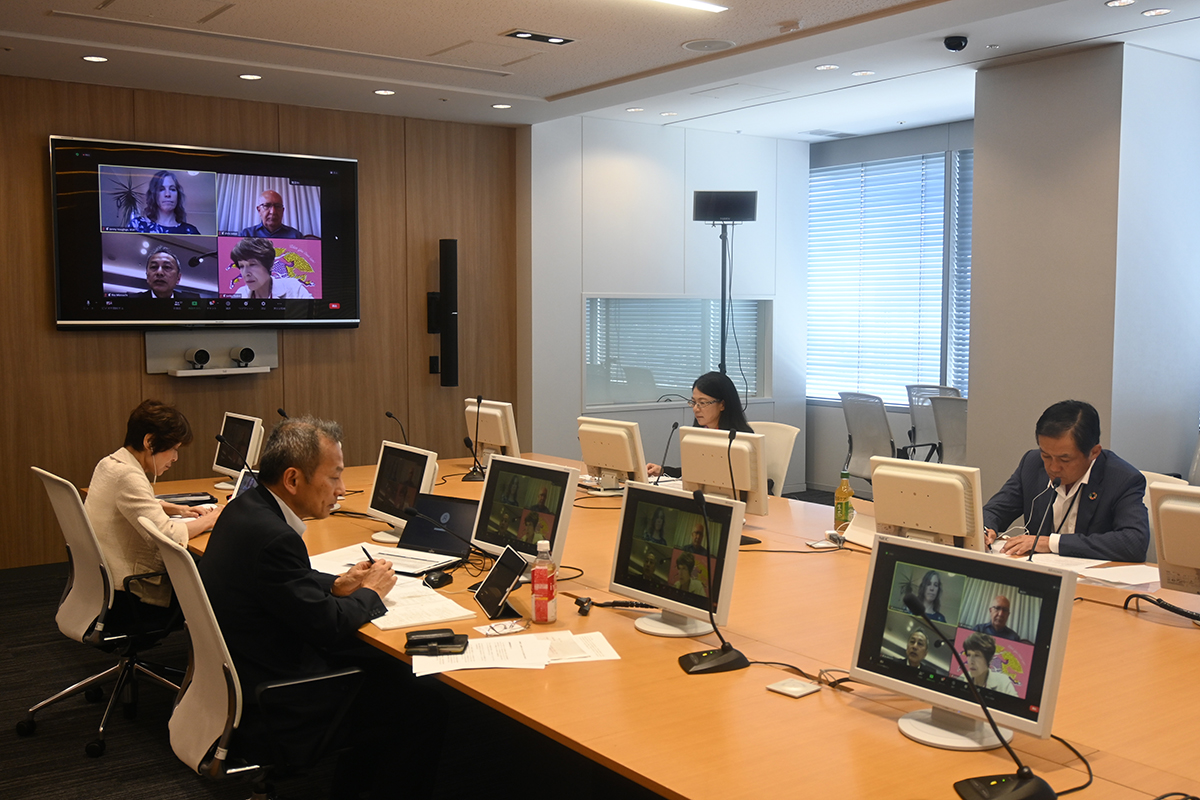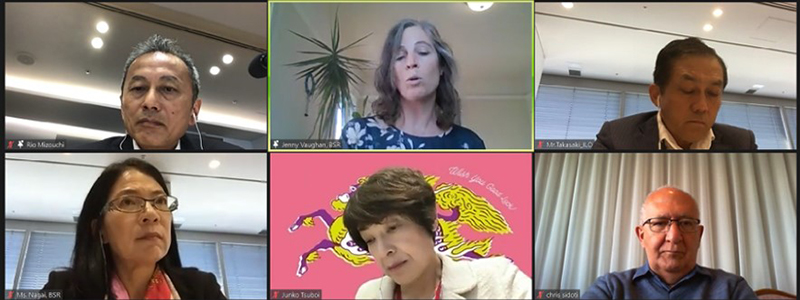Kirin Group Human Rights Policy
The Creation Process for the Group's Human Rights Policy
Kirin Group Human Rights Policy
1. Background to Our Respect for Human Rights
We have set the goal of becoming a global leader in CSV*1 in the domains of Food & Beverages, Health Science and Pharmaceuticals under our corporate philosophy: "KIRIN brings joy to society by crafting food and healthcare products inspired by the blessings of nature and the insights of our customers". We recognize respect for human rights as the foundation of all of our business activities: it is a prerequisite to solving social issues through our business and achieving sustainable growth together with society.
The Kirin Group regards respect for the human rights of all stakeholders as a key management issue and will continue to address this issue and develop a system therefor.
To respect the human rights of all stakeholders, we take efforts to identify, prevent, and mitigate adverse human rights impacts and implement appropriate measures for remediation.
Beyond this, we will accelerate innovation through diversity, equity and inclusion efforts, aiming to create positive impact and further enhancement of social value.
2. Human Rights Policy
Human rights are the inherent rights of every human being.
Based on the conviction that “All human beings are born free and equal in dignity and rights,”*2 the Kirin Group positions its Human Rights Policy (hereafter referred to as “this Policy") as the dominant policy for all documents and standards *3 related to management measures that support respect for human rights within the Kirin Group’s business activities. As such, this Policy applies to all executives and employees*4 of the Kirin Group*5.
We request all business partners involved in the value chain to acknowledge and comply with this Policy.
We regard all activities throughout the value chain in all business areas of the Kirin Group, including the consumption, use, and disposal at R&D, procurement of raw materials, manufacturing, transportation, distribution, marketing, sales, and services, as potentially having direct or indirect human rights impacts.
We support the international human rights standards*10 including International Bill of Human Rights,*6 the International Labour Organization's (ILO) Declaration on Fundamental Principles and Rights at Work*7, the MNE Declaration*8, the UN Guiding Principles on Business and Human Rights,*9 the Ten Principles of the UN Global Compact, the OECD Guidelines for Multinational Enterprises, etc. and are committed to continuing to respect human rights in accordance with the procedures set forth therein.
We are a signatory to the United Nations Global Compact.
We comply with the laws and regulations of each country and region. Where national law and international human rights standards differ, we will follow the higher standard; where they are in conflict, we will require ways to respect internationally recognized human rights to the greatest extent possible.
If it becomes clear that our business activities have caused or contributed to any adverse human rights impacts, we will fulfill our responsibility to respect human rights by working to remedy the situation through dialogue and appropriate procedures based on international standards*11
3. Key Human Rights Issues
We continuously work to ensure respect for human rights of all people associated with the Kirin Group. We strive to identify potential human rights impacts and stakeholders who may be subject to adverse human rights impacts related to our business, prevent and mitigate adverse impacts and implement appropriate remediation measures wherever adverse impacts have actually occurred. We do not tolerate any form of discrimination based on race, color, ethnicity, nationality, social status, lineage, sex, disability, health condition, religion, ideology, faith, sexual orientation, gender identity, occupation or occupational status.
We also recognize that vulnerable groups throughout the value chain are likely to be subject to adverse human rights impacts and will give special consideration to respecting the human rights of social minorities, including highly vulnerable people, women, children, persons with disabilities, ethnic minorities, indigenous people and linguistic minorities.
We oppose any form of slavery or forced labor, including human trafficking, and child labor*12 throughout the value chain of our business activities.
We recognize the importance of understanding our human rights impacts from the perspective of those affected.
- Consumers
We are committed to consumer satisfaction and to providing safe and secure products and services, and we will promote access to products and services that take into account consumer’s attributes and other factors. At the same time, we respect children’s rights, in particular their rights to health, and strive to eliminate the harmful consumption of alcohol as our responsibility as a producer of alcoholic beverages.
As a pharmaceutical company, we strive to ensure the stable supply, safety and reliability of pharmaceuticals, promote access to pharmaceuticals, develop innovative drugs on a global scale and provide life-changing value to as many patients as possible.
In the health science domain, including health foods, we will expand research and development based on fermentation and biotechnology, which are our strengths, and create new value that leads to solving global health issues, thus contributing to the well-being of people around the world. - Business Partners
We request all business partners in our value chain to comply with the following: ensuring a safe and healthy environment in the workplace, respecting freedom of association and the right to collective bargaining, providing fair and appropriate wages and benefits in compliance with the law, adequately managing working hours to prevent overworking, prohibiting harassment, assuring fair working conditions, as well as prohibiting forced labor and child labor, etc.
The items to be complied with by suppliers, including respect for human rights, are set forth in the "Kirin Group Sustainable Supplier Code"*13. We also request our business partners other than our suppliers to make the same efforts to respect human rights.
We will provide appropriate support to our business partners according to their characteristics and needs, including briefings and training sessions to enhance their understanding of respect for human rights. - Community
We respect the human rights, including the right to land and access to water, of people in each country and community, including indigenous people and small farmers affected by our operations. - Employees
We will ensure fair working conditions and a safe and healthy environment in the workplace for our employees. We implement responsible labor practices, including respect for freedom of association and the right to collective bargaining, fair evaluation and treatment, provision of fair and appropriate wages and benefits in compliance with the law, management of adequate working hours to prevent overworking, and prohibition of harassment.
In addition to the above, we will give consideration to potential human rights risks in our marketing activities and other communications*14 and will not use discriminatory expressions or expressions that may have an adverse impact on children.
We will give special consideration to human rights related to business ethics, such as ethical research and development and responsible marketing and sales, as well as human rights in conflict-affected and high-risk countries, achieve diversity, equity and inclusion, and respect human rights related to the entire value chain.
4. Human Rights Governance and Education
The Board of Directors of Kirin Holdings is responsible for overseeing Kirin Group's respect for human rights, the policies and action plans for addressing human rights issues, and the status of management measures. For the Senior Executive Officer and the Director of the Board & Senior Executive Officer, we have adopted a system whereby their human rights management measures are reflected in their remunerations.
The Executive Officer of Group Human Capital Management is responsible for efforts to respect human rights.
The Group Business and Human Rights Meeting*15 has been established as a sub-committee of the Kirin Holdings Group CSV Committee to draft human rights policies, strategies and plans, and monitor the progress of the roadmap for human rights. The content of the meetings is reported to the Group CSV Committee and reported to and discussed by the Board of Directors and reflected in the Group's overall strategies.
In addition, we have established a Team in Charge of Business and Human Rights *16 to carry out domestic and international human rights practices. The team conducts human rights due diligence and relief responses to human rights issues, as well as education and training on human rights, which are continuously enhanced through a regular cycle of planning, execution, and monitoring to ensure that Kirin Group executives and employees are capable of respecting human rights in their daily activities.
5. Our Commitment to Human Rights Due Diligence for Respecting Human Rights
We conduct human rights due diligence to gain a deep understanding of the countries and regions we operate in, together with the various human rights issues that exist in each stage of the value chain, in order to identify, prevent and mitigate the potential adverse human rights impacts related to our business in accordance with the United Nation Guiding Principles on Business and Human Rights*9 and the OECD Due Diligence Guidance for Responsible Business Conduct*17
We regard human rights due diligence as an ongoing process and will implement the process of identifying human rights issues in the value chain, planning and implementing remediation, monitoring, disclosing information, and communicating with external stakeholders.
6. Grievance Mechanisms and Access to Remedy
We will deliver an appropriate and effective remedy where we identify that we have caused or contributed to adverse human rights impacts.
We will play a role in remediation where adverse human rights impacts are directly or indirectly linked to our products and services due to business relationships.
We take all grievances of our stakeholders seriously and are committed to providing appropriate remedy towards an effective resolution.
To ensure access to remedy, we have established a grievance hotline*16 available to all stakeholders as an effective response mechanism to address human rights concerns, and we will implement appropriate measures in response to raised grievances. We ensure that the personal information of the person making a report is protected and prohibit such person from being treated unfairly or subjected to intimidation or retaliation. We do not tolerate any threats, intimidation, or physical or legal attacks on human rights defenders, including those who exercise their right to oppose various forms of human rights abuses.
7. Human Rights Communication and Stakeholder Engagement
We will disclose our progress in our efforts to respect human rights and the results of human rights due diligence in a timely and appropriate manner through Kirin Holdings Company's website, etc.
We will continue to engage with our various stakeholders, including vulnerable populations, to promote our human rights activities.
We have benefited from the views of internal and external stakeholders including the labor union, in revising the Human Rights Policy established in 2018.
We will continue to regularly review and evolve our practices to respect human rights based on changes in societal demands, including laws and regulations, as well as the business environment and business activities, etc. surrounding the Kirin Group.
Established: 9 February 2018
Revised: 16 October, 2023

Kirin Holdings Company, Limited
Yoshinori Isozaki, President & CEO
This Policy has been approved by our Board of Directors and signed by the President & CEO.
Annotations
- CSV: Short for Creating Shared Value. See below for details
Impact | Kirin Holdings - Quoted from Article 1 of the Universal Declaration of Human Rights
https://www.ohchr.org/en/human-rights/universal-declaration/translations/english - Main policies related to human rights:
Kirin Group Compliance Policy, Kirin Group Compliance Guidelines
Compliance | Corporate Governance | Kirin Holdings
Kirin Group Sustainable Supplier Code
Kirin Group Sustainable Supplier Code (kirinholdings.com)
Marketing Communication Policy
Marketing Communication Policy (MCP) | CSV Management | Kirin Holdings
Privacy Policy
Privacy Policy | Kirin Holdings - Employees include part-time, contract and dispatch workers, etc.
- The Kirin Group refers to Kirin Holdings Company, Limited and its consolidated subsidiaries directly under Kirin Holdings Company, Limited and their constituent companies.
- The International Bill of Human Rights consists of the Universal Declaration of Human Rights, the International Covenant on Civil and Political Rights and the International Covenant on Economic, Social and Cultural Rights. It is widely regarded as the fundamental human rights protection framework in the international community.
- The Declaration on Fundamental Principles and Rights at Work calls for freedom of association and the effective recognition of the right to collective bargaining, the elimination of all forms of forced or compulsory labour, the effective abolition of child labour and the elimination of discrimination in respect of employment and occupation.
- The official name of the MNE Declaration is the Tripartite Declaration of Principles on Multinational Enterprises and Social Policy. It is an ILO document that provides direct guidance to companies on social policy and inclusive, responsible, and sustainable business practices.
- The United Nations Guiding Principles on Business and Human Rights, endorsed by the United Nations Human Rights Council in 2011, are the authoritative global standard for States and businesses to prevent and address the risk of adverse impact on human rights linked to business activities.
- The United Nations Declaration of the Rights on Indigenous Peoples, the Declaration of Helsinki – Ethical Principles for Medical Research Involving Human Subjects, the Children's Rights and Business Principles, the Women's Empowerment Principles, the OECD Guidelines for Multinational Enterprises
- Basic Principles and Guidelines on the Right to a Remedy and Reparation for Victims of Gross Violations of International Human Rights Law and Serious Violations of International Humanitarian Law:
Basic Principles and Guidelines on the Right to a Remedy and Reparation for Victims of Gross Violations of International Human Rights Law and Serious Violations of International Humanitarian Law | OHCHR - In accordance with the Children's Rights and Business Principles, when employing young workers under the age of 18, they are not allowed to work in hazardous jobs that impair their physical and mental development.
- Kirin Group Sustainable Supplier Code
Kirin Group Sustainable Supplier Code (kirinholdings.com) - Marketing Communication Policy
Marketing Communication Policy (MCP) | CSV Management | Kirin Holdings
Privacy Policy
Privacy Policy | Kirin Holdings - The Group Business and Human Rights Meeting is chaired by the Senior Executive Officer of Personnel and General Affairs and its members consist of the Senior Executive Officer or General Manager of Risk Management, CSV Strategy, Supply Chain Management, Procurement and Corporate Planning. Regular meetings are held at least twice a year, and extraordinary meetings are held when necessary. The details of these meetings are reported to and discussed by the Group CSV Committee, the Kirin Holdings Group Executive Committee and the Board of Directors and reflected in the Group's overall strategies and plans.
- The Team in Charge of Business and Human Rights is a team consisting of personnel in charge of Human Resources, Risk Compliance, Procurement, CSV, etc., and is responsible for the implementation of human rights practices.
- The OECD Due Diligence Guidance for Responsible Business Conduct:
https://mneguidelines.oecd.org/OECD-Due-Diligence-Guidance-for-Responsible-Business-Conduct.pdf - We have joined JaCER, which provides a reporting hotline for all stakeholders.
JaCER’s site for reporting a grievance
Report a Grievance|JaCER (jacer-bhr.org)
Stakeholder Engagement
In reviewing our human rights policy, we exchanged opinions with human rights experts in their respective areas of expertise and with the relevant officers. The opinions of the human rights experts were received and incorporated into this policy. The opinions are listed below.
| Item | Opinions |
|---|---|
| About Human Rights Due Diligence Assessments | Although it mentions local communities broadly, it does not go so far as to cover the human rights situation at the national level, and I think we can make the most of what we have learned in Myanmar by including such perspectives. This is also a point that is relevant to human rights DD, and I believe that consideration of the human rights of local communities should be fully addressed in the Human Rights Policy. I agree with your approach that emphasizes engagement. |
| About positive impacts | I respect that Kirin is trying to create positive impacts on human rights. Although it states at the beginning that it aims for positive impacts, I don't see a specific impact. It would be difficult to understand if you were to jump directly to making positive impacts on society, but I think it would be easier to understand contextually if you start with creating a positive impact from the employees who are closest to the company. |
| Reflecting the Content of the UN Guiding Principles on Business and Human Rights | I think one point that is a bit disconcerting from a stakeholder's perspective is that it does not sufficiently include the UNGPs’ requirement that businesses prevent, reduce and address the most serious negative human rights impacts. As a stakeholder, I recommend that the perspective on how to address each issue, including collaboration with business partners, be elaborated on. |
Experts who contributed to the stakeholder engagement
Human rights lawyer
Mr. Chris Sidoti
International Labour Organization (ILO)
Representative ILO Office in Japan
Mr. Shinichi Takasaki
Business for Social Responsibility
San Francisco Office
Managing Director of Human Rights
Ms. Jenny Vaughan
Moderator
Business for Social Responsibility
Tokyo Office
Managing Director
Ms. Asako Nagai
